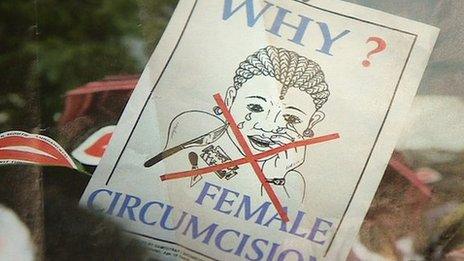Bid to end female genital mutilation in Wales
- Published

Female genital mutilation is often carried out on babies and children as young as four without aesthetic
Young girls and women in Wales are among thousands in the UK who become victims of female genital mutilation (FGM), researchers have said.
Charities and organisations have come together in Cardiff to discuss how to stop the illegal practice, which is often performed without anaesthetic.
In England, a database has been set up logging the number of victims seen by doctors within the NHS.
It is hoped cases in Wales can be recorded in a similar way.
FGM involves the partial or total removal of the external female genital organs and is common to some African, Asian and Middle Eastern communities.
It is carried out for cultural reasons and experts say it is a means of repressing female sexuality.
The charity BAWSO, which supports women affected by FGM, said it had helped 16 women and girls living in Wales at risk last year.
FGM has been a criminal offence in the UK since 1985, but no one in Britain has been prosecuted, despite reports that it is on the rise.
The charity Forward UK (Foundation for Women's Health Research and Development) has estimated about 6,500 girls in the UK are at risk of FGM every year.
But researchers believe the vast majority of cases go unreported because the girls are so young and loyal to their families.
Lasting and irreversible
To coincide with the United Nations day of zero tolerance on FGM, the Welsh government and Welsh FGM Forum has hosted a conference to tackle the practice.
"The UK government is working with the Welsh government via the anti slavery coordinator on this," said Kate Carr, policy officer at NSPCC Cymru Wales.
"We want to break down barriers and discuss data collecting."
Dr Amanda Robinson, from Cardiff University and co-author of a report into gender-based violence, added: "Women told us that it was often performed by elder women and that it could also happen as a precursor to marriage at the insistence of the prospective husband and his family.
"But while it may be justified in cultural terms, it is a form of violence and a means of repressing female sexuality which causes lasting and irreversible physical and psychological damage."
FGM is often carried out without anaesthetic and victims are usually aged between four and ten, but some are babies.
- Published5 February 2014
- Published15 November 2013
- Published4 November 2013
- Published6 September 2013
- Published25 July 2013